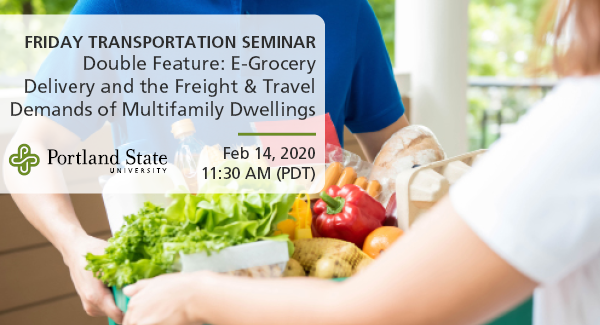
Friday Transportation Seminars at Portland State University have been a tradition since 2000. You can join us in person at 11:30 AM, or you can also watch online.
PRESENTATION ARCHIVE
- Watch the video
- View Katherine Keeling's presentation slides: E-Grocery Home Delivery Impacts on Food Access and Equity
- View Gabby Abou-Zeid's presentation slides: A Preliminary Overview of Freight and Travel Demand at Multifamily Apartment Buildings in Portland, OR
THE TOPICS
Katherine Keeling, Portland State University
 Katherine Keeling is a first-year MSCE student and graduate research assistant for Dr. Miguel Figliozzi in civil & environmental engineering at Portland State University. Her research topics include bus-bicycle conflicts, e-grocery home delivery (as last-mile logistics), and the relationship between parking behavior and regulatory fines. For 2019-2020, she serves as Vice President of Communications for Students in Transportation Engineering and Planning (STEP), PSU's student chapter of the Institute of Transportation Engineers (ITE). She loves getting people to try e-scooters for the first time.
Katherine Keeling is a first-year MSCE student and graduate research assistant for Dr. Miguel Figliozzi in civil & environmental engineering at Portland State University. Her research topics include bus-bicycle conflicts, e-grocery home delivery (as last-mile logistics), and the relationship between parking behavior and regulatory fines. For 2019-2020, she serves as Vice President of Communications for Students in Transportation Engineering and Planning (STEP), PSU's student chapter of the Institute of Transportation Engineers (ITE). She loves getting people to try e-scooters for the first time.
E-Grocery Home Delivery Impacts on Food Access and Equity
The adoption of e-grocery home delivery (HD) has the potential to change social norms of acquiring household foods and necessities. In light of recent interest in food deserts, a case study of Portland, OR reviews the new elements of inclusion, exclusion, and value created by the service of four major e-grocery businesses: Shipt, Instacart, Walmart, and Amazon Prime Now. These e-grocers are reviewed in terms of service areas, pricing, and inventory choice, as these are key factors on consumer experience. An equity matrix developed by the City of Portland is also applied. It is important to note that e-grocery service areas are rapidly changing, however a July 2019 coverage analysis found that at least 94% of residents in the Portland metropolitan statistical area have access to HD from at least one retailer. A total of 22 census tracts identified as low-income, low-access (LILA) by the USDA which house 91% of the LILA population in the region were included in an e-grocery HD service area. E-grocery home delivery is discussed with attention to vulnerable population groups that may experience barriers to adoption, as well as vulnerable populations that may benefit. Additionally, we discuss ancillary issues such as the challenges faced by delivery drivers.
Gabby Abou-Zeid, Portland State University
 Gabby Abou-Zeid is a first-year graduate student pursuing her M.S. in civil engineering at Portland State University and working with Dr. Kelly Clifton's SUPER (Sustainable Urban Planning & Engineering Research) Lab. Her research has focused on walkability and pedestrian travel as well as intersections between transportation and land use. Currently, she is wrapping up a project with Dr. Clifton for the Portland Bureau of Transportation to assess the relationship between travel behavior and urban freight demand. She plans on pursuing a PhD in a transportation-related field after her master's program.
Gabby Abou-Zeid is a first-year graduate student pursuing her M.S. in civil engineering at Portland State University and working with Dr. Kelly Clifton's SUPER (Sustainable Urban Planning & Engineering Research) Lab. Her research has focused on walkability and pedestrian travel as well as intersections between transportation and land use. Currently, she is wrapping up a project with Dr. Clifton for the Portland Bureau of Transportation to assess the relationship between travel behavior and urban freight demand. She plans on pursuing a PhD in a transportation-related field after her master's program.
A Preliminary Overview of Freight and Travel Demand at Multifamily Apartment Buildings in Portland, OR
Trip generation—derived estimates of person and vehicle travel to and from a site—is traditionally the first step of transportation impact analyses for new development. There is growing concern about the suitability of industry-standard trip generation methods and data to adequately capture elements for current and future planning needs. Simultaneously, the line between freight and passenger travel is increasingly blurred, as a variety of goods and services are available for quick and cheap delivery, especially in highly urban contexts. The rise of e-commerce and availability of non-auto modes call for development of a new framework to evaluate new development. To contribute to this effort, person and motorized vehicle counts at 12 multifamily apartment buildings in Portland, OR were collected using industry standard methods. Surveys of residents, delivery personnel, and visitors to each site allowed for collection of additional information on mode, freight demand, and freight delivery making. Preliminary findings show that off-site vehicle trips – not typically captured in trip generation – make up a substantial portion of daily trip-making. Peak periods for person trip-making overall appear opposite those for deliveries to the sites. Next steps for research are outlined and insight for future data collection efforts is offered.
PROFESSIONAL DEVELOPMENT
This 60-minute seminar is eligible for 1 hour of professional development credit for AICP (see our provider summary). We provide an electronic attendance certificate for other types of certification maintenance.
LEARN MORE
Sign up for our newsletter to receive monthly updates.
Image by Kritchanut/iStock
The Transportation Research and Education Center (TREC) at Portland State University is home to the National Institute for Transportation and Communities (NITC), the Initiative for Bicycle and Pedestrian Innovation (IBPI), and other transportation programs. TREC produces research and tools for transportation decision makers, develops K-12 curriculum to expand the diversity and capacity of the workforce, and engages students and professionals through education.
